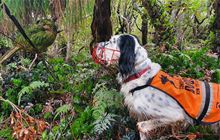Clever canines developing a nose for conservation in Taranaki
Archived content: This media release was accurate on the date of publication.
Introduction
DOC has two new rangers-in-training to help protect Taranaki’s endangered wildlife – puppies Pip and Roscoe.Date: 09 May 2023
The four-legged “trainee rangers” are being up-skilled by Biodiversity Rangers Joe Carson and Raúl Johnson, to become certified conservation dogs.
Six-month-old Pip – a German shorthaired pointer-border collie cross – is in training to become a protected species detection dog specialising in whio/blue duck. If successful with her certification, she will assist Joe monitoring the endangered species on the rivers and streams of Taranaki Maunga.
Having a trained dog able to find the elusive whio makes life easier when monitoring the species, says Joe.
“Pip will use her incredible sense of smell to locate birds hiding in roosts and rocks, indicating them from a safe distance, which means the whio can remain comfortable in their environment,” says Joe.
“Having Pip out on the river with us will make monitoring much more efficient, helping us to cover more ground and determine a more precise number of birds and nests.
“More information we can source on their locations and breeding can sharpen our pest control focus to further protect these beautiful taonga,” she adds.
With a total population of less than 3000, the endangered whio are rarer than some species of kiwi.
Roscoe – a Jack Russell-fox terrier cross – is being trained to sniff out and indicate ferrets. Roscoe is the first conservation dog to focus solely on ferrets, as opposed to mustelids in general. The focus on ferrets stems from recent incidents in Taranaki, including the Kaitake Ranges, in which the deaths of kiwi have been attributed to ferret predation.
Ferrets are a particularly dangerous to native wildlife as they are large and can easily kill adult kiwi. Once they are ‘into’ a scent of kiwi an individual ferret can decimate a population..
“Ferrets are wily and harder to catch using standard pest control methods compared to mustelids such as stoats,” says Raúl.
“Having a specially trained dog will help us track down these elusive and damaging predators.”
Training a conservation dog and handler team is a serious and long-term commitment, taking around 18 months of daily work and routine.
The teams are required to meet a high standard to pass certification assessments and to maintain their standard at that level. Once certified they will still need to train several times a week for the duration of the dog’s working life (up to 12 years, depending on the species).
For Pip and Roscoe there are still hurdles to climb over and hoops to jump through before they can be given their DOC uniform. Feedback so far is they are doing well.
However, it’s not just the puppies who have to be put through their paces. To train a safe and successful dog, handlers must have experience of working with the target protected or pest species, plus dog-handling and training experience.
Joe is well known on Taranaki Maunga for her work alongside her whio dog Tai who tragically died last year. Raúl has years of experience in the pest control field, utilising many different methods. He has been active in kiwi conservation furthering his desire to protect this treasured species.
Background information
Conservation dogs
Conservation dogs are a highly effective tool to support conservation goals.
There are more than 120 fully certified dogs in DOC’s conservation dogs programme, around 80 detect pests and around 45 detect species.
Whio/blue duck
Whio/blue duck were reintroduced to the Taranaki/Egmont National Park in 2000 and ongoing translocations occur to ensure successful establishment of the population.
Predator trap lines in the park are checked 18 times a year and this has helped the whio achieve successful breeding in the area.
You can support whio by being a responsible pet owner, helping with predator control and keeping your vehicle off riverbeds.
Contact
For media enquiries contact:
Email: media@doc.govt.nz


